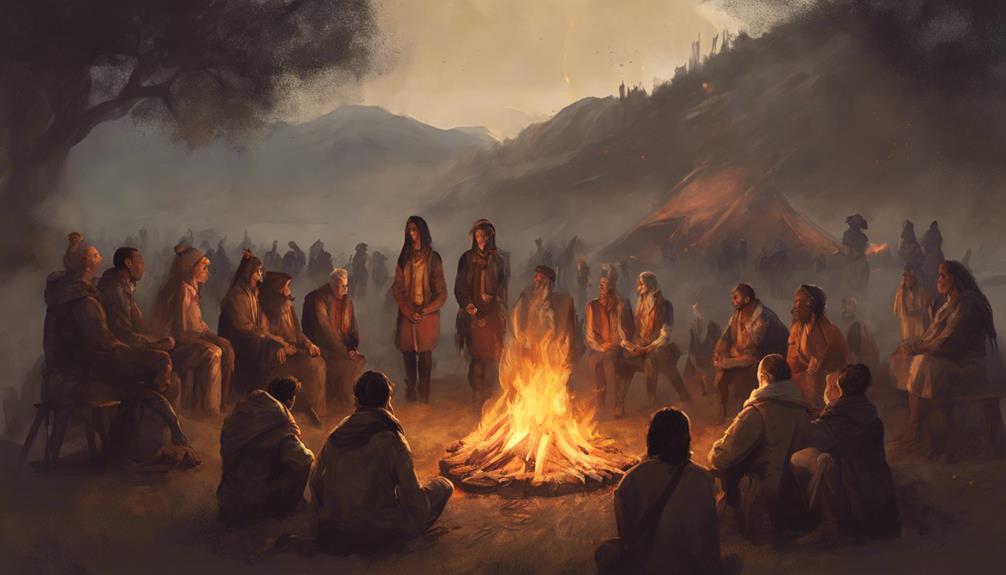The inception of traditions holds a particular intrigue, as it involves a complex interplay of societal, historical, and psychological factors. Understanding how traditions start requires a critical examination of their underlying mechanisms, the cultural contexts that nurture them, and the human need for continuity and connection. By dissecting the origins of traditions, we can unravel the intricate web of influences that shape our shared practices and beliefs, shedding light on the enduring legacy traditions leave behind.
Key Takeaways
- Traditions start from historical events, rituals, and beliefs.
- Family traditions foster unity and continuity across generations.
- Shared experiences and values are passed down, shaping cultural heritage.
- New family members can influence the creation or modification of traditions.
Origins of Cultural Traditions
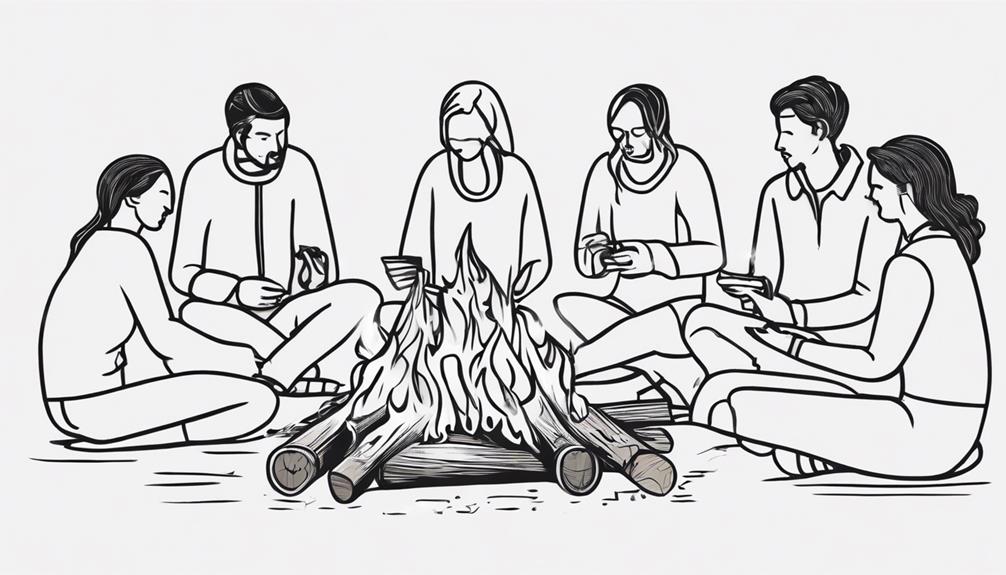
The origins of cultural traditions can be traced back to historical events, rituals, or beliefs that have been transmitted across generations. Within the context of family, traditions serve as a means of fostering a sense of unity, belonging, and continuity. These traditions are often deeply rooted in shared experiences, values, and customs that are passed down from one generation to the next. As families evolve and adapt to changing circumstances, new traditions may emerge to reflect the shifting dynamics within the family unit.
The formation of new traditions within families can be influenced by a variety of factors, such as societal changes, technological advancements, and intercultural exchanges. As families navigate these influences, they may choose to incorporate elements from different cultures or create entirely unique traditions that resonate with their values and beliefs. In this way, cultural traditions continue to evolve and adapt to the ever-changing world while remaining a vital aspect of family life.
Influences on Tradition Formation
In exploring the influences on tradition formation, it becomes evident that the interplay of cultural heritage, religious practices, and family values significantly shapes the development and perpetuation of traditions within societies. Family traditions, in particular, play a crucial role in this process. Over time, families create and uphold traditions as a means of fostering connections and shared experiences among members. These traditions often reflect the values and beliefs that are important to the family unit, serving as a way to pass down cultural heritage and reinforce a sense of identity.
As families evolve and new generations emerge, the formation of traditions may adapt to accommodate changing dynamics and values. The introduction of new family members, whether through birth, marriage, or other means, can bring about the creation of new traditions or the modification of existing ones to incorporate diverse perspectives and experiences. The intergenerational transmission of traditions within families underscores the significance of family influences in shaping the ongoing evolution of cultural practices and beliefs.
Role of Storytelling in Traditions
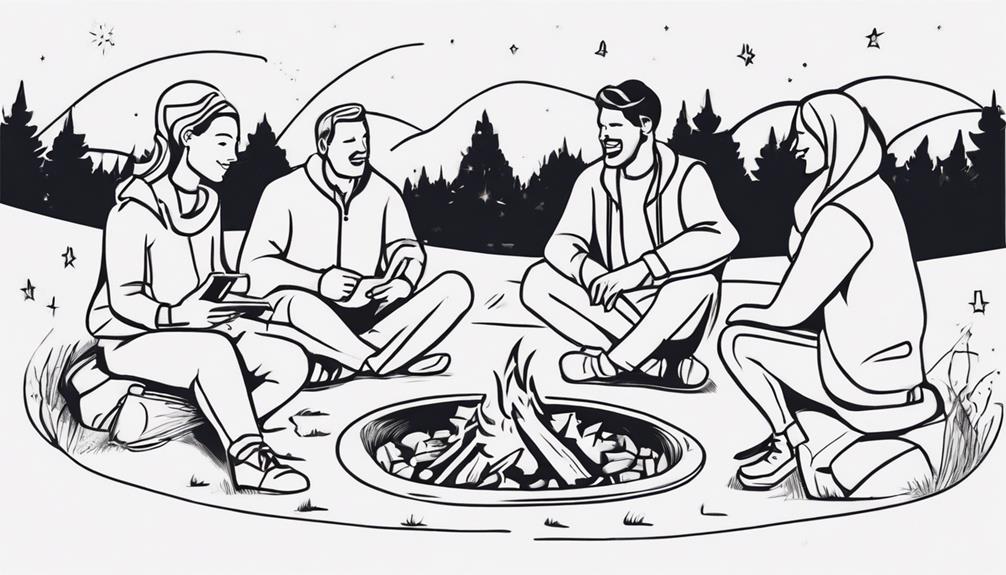
An essential aspect of tradition formation lies in the pivotal role that storytelling assumes in perpetuating cultural practices and values across generations. Family traditions are important in maintaining a sense of identity and connection within a family unit. Storytelling serves as a powerful tool for passing down these traditions from one generation to the next, ensuring that they are not lost or forgotten. Through storytelling, families can preserve their cultural heritage, values, and memories, fostering a sense of continuity and belonging over time.
| Benefits of Storytelling in Family Traditions | ||
|---|---|---|
| Preserves Cultural Heritage | Connects Family Members | Adds Depth and Meaning to Traditions |
| Strengthens Family Bonds | Fosters Shared Experiences | Reinforces Importance of Traditions |
| Creates Sense of Identity and Belonging | Transmits Values and Memories | Perpetuates Traditions Across Time |
Evolution of Traditional Practices
Storytelling, as a foundational element in the establishment and perpetuation of family traditions, plays a crucial role in shaping the evolution of traditional practices over time. Traditional practices often originate from deeply rooted cultural beliefs, passed down through generations. The evolution of traditions is not a static process; it can be influenced by societal changes and technological advancements that impact how traditions are practiced and perceived. Despite these influences, traditional practices adapt to modern contexts while still holding onto their core values and significance, showcasing the dynamic nature of cultural heritage. Some traditional practices evolve to cater to individual family needs and preferences, reflecting the personalized nature of traditions within different family units. Moreover, traditional practices may shift over time due to global influences and changing family dynamics, highlighting the interconnectedness between tradition and the broader social environment.
Significance of Historical Events in Traditions
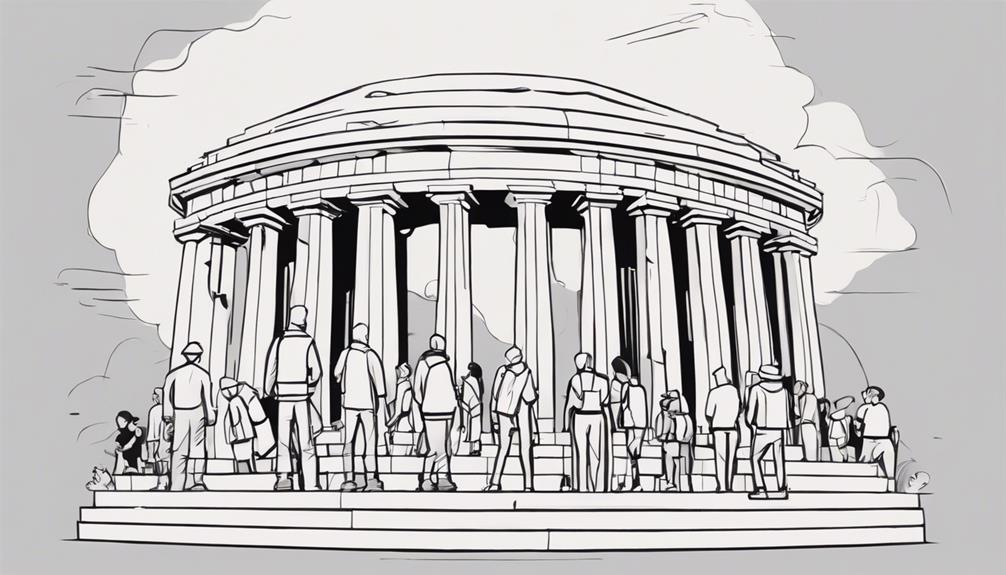
Historical events play a crucial role in shaping traditions, serving as the foundation upon which cultural practices evolve. These events hold significant meaning, providing a link between the past and the present through the rituals and customs that emerge. Understanding the historical backdrop of traditions enhances their significance, contributing to the richness of heritage and identity.
Historical Events Impact Traditions
The impact of historical events on the formation and evolution of traditions is profound, shaping cultural norms and practices that endure through time.
- Historical events can shape cultural norms and practices that evolve into traditions.
- Traditions may originate from pivotal moments like wars, migrations, or societal changes.
- Events like Independence Day or significant cultural shifts can spark new traditions.
- Traditions rooted in historical events often carry deep emotional and symbolic meanings.
- Understanding the historical context behind traditions can enrich their significance and importance.
Evolution of Cultural Practices
Cultural practices undergo a continual evolution influenced by historical events such as wars, migrations, and religious transformations, shaping the traditions that define communities and societies. These practices are often passed down from generation to generation within families, carrying with them the values and beliefs of past societies. By adapting to changing circumstances, cultural practices ensure their survival and relevance in modern times. The table below illustrates the significance of historical events in the evolution of cultural practices:
| Historical Event | Influence on Cultural Practices |
|---|---|
| Wars | Shift in societal values and norms |
| Migrations | Introduction of new traditions |
| Religious Transformations | Evolution of spiritual practices |
| Societal Changes | Adaptation to current needs |
| Technological Advancements | Integration of new customs |
Impact of Societal Changes on Traditions
In the midst of ongoing urbanization and globalization, societal transformations have significantly influenced the evolution of traditional family structures and values.
- Societal changes like urbanization and globalization have led to a shift in traditional family structures and values.
- Technological advancements and changing work patterns have reduced the time families spend together, impacting the formation of traditions.
- Increased mobility and multicultural influences have introduced new ideas and practices, challenging the preservation of traditional customs.
- Changing attitudes towards marriage, parenthood, and gender roles have altered the dynamics of family traditions over time.
- Economic pressures and societal expectations have influenced the prioritization of family traditions, leading to adaptations and innovations in how they are established and maintained.
These factors have collectively contributed to the reshaping of family traditions, as modern challenges and opportunities continue to redefine the way families interact and engage with their cultural heritage.
Importance of Passing Down Traditions
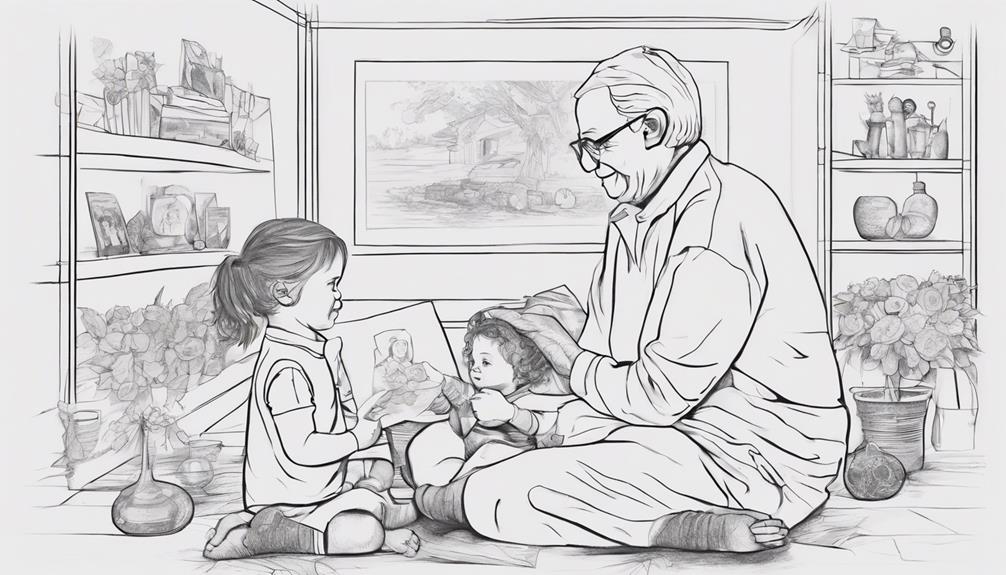
Regularly passing down traditions within a family unit is essential for preserving cultural heritage and reinforcing intergenerational bonds. Family traditions serve as a crucial link between past, present, and future generations, carrying with them the values, beliefs, and customs that define a family's identity. By passing down traditions, families create a sense of continuity and stability, providing children with a strong foundation rooted in their cultural background. This practice not only instills a sense of belonging and pride but also fosters a deeper connection with ancestors and shared history. Through the transmission of traditions, family bonds are strengthened, relationships are nurtured, and a sense of unity is established across generations. Embracing and passing down family traditions is a way to honor the past while building a bridge to the future.
| Benefits of Passing Down Traditions |
|---|
| Preserves cultural heritage |
| Fosters a sense of belonging |
| Strengthens family bonds |
Traditions in Modern Society
In modern society, the evolution of traditions is crucial as these customs adapt to contemporary lifestyles and societal structures. Understanding the impact of these evolving traditions on communities is essential for assessing their relevance and significance in maintaining social cohesion. Analyzing how local traditions manifest in today's society sheds light on the role they play in fostering a sense of identity and belonging among community members.
Evolution of Traditions
The evolution of traditions in modern society is intricately intertwined with the dynamic interplay of historical, cultural, and social forces.
- Changes in family structures and values impact the initiation and continuation of traditions.
- Technological advancements and globalization have altered the way traditions are created and maintained.
- Modern traditions may focus on inclusivity, diversity, and sustainability to adapt to changing norms.
- The digital age has introduced new forms of traditions, such as online rituals and virtual gatherings.
These shifts reflect an evolving landscape where traditional practices blend with contemporary influences, shaping the fabric of societal customs. As family dynamics evolve and societal norms shift, the creation of new traditions and the reinterpretation of existing ones by family members become pivotal in the ongoing evolution of traditions in modern society.
Impact on Communities
The role of traditional practices within communities is pivotal in shaping societal cohesion and fostering a shared sense of identity and belonging in modern society. Family traditions, community ties, and a sense of belonging are fundamental aspects that contribute to the fabric of a community. The table below highlights the significance of these elements in modern society:
| Family Traditions | Community Ties | Sense of Belonging |
|---|---|---|
| Passed down through generations | Strengthen social bonds | Fosters connection and acceptance |
| Creates a sense of continuity | Encourages cooperation | Enhances well-being and mental health |
| Shapes individual identities | Promotes inclusivity | Provides a support network |
| Celebrates shared values | Builds resilience | Reduces feelings of isolation |
| Promotes unity and togetherness | Preserves cultural heritage | Encourages civic engagement |
Cultural Diversity in Traditions
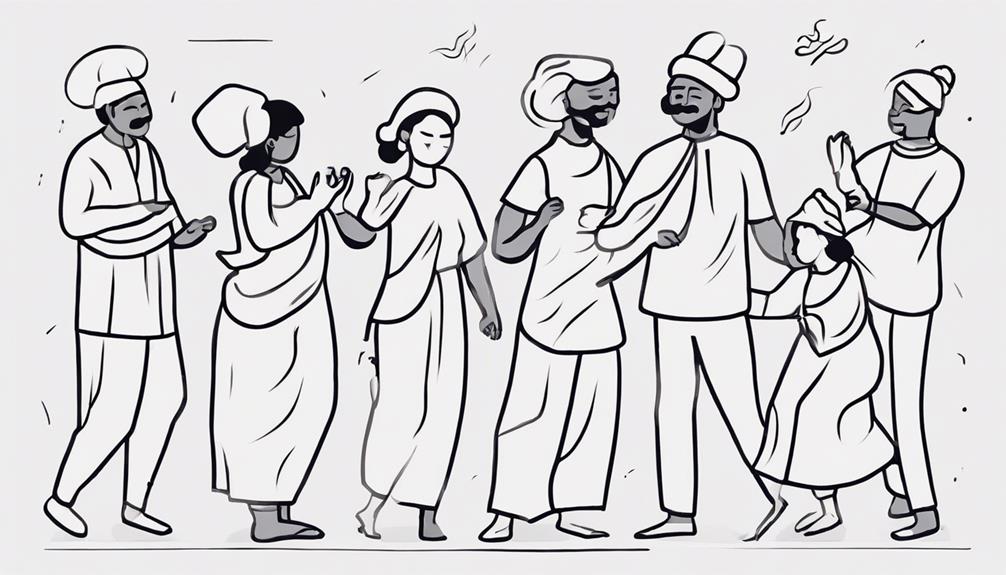
Embodying a kaleidoscope of customs and beliefs, cultural diversity in traditions serves as a testament to the multifaceted nature of human societies. This diversity stems from a variety of sources, including family traditions, cultural backgrounds, and societal influences. Here are some key points to consider:
- Cultural diversity in traditions reflects the variety of customs, beliefs, and practices across different cultural groups.
- Traditions are influenced by cultural backgrounds, geographical locations, historical events, and societal norms.
- Different cultural traditions contribute to the richness and uniqueness of each community or ethnic group.
- Cultural diversity in traditions promotes understanding, respect, and appreciation for various cultural heritages.
- Learning about diverse traditions helps individuals embrace multiculturalism and foster a sense of global unity.
Understanding and celebrating cultural diversity in traditions not only enriches our knowledge of different societies but also fosters a more inclusive and interconnected world.
Symbolism in Traditional Customs
Symbolism in traditional customs plays a vital role in conveying underlying meanings and cultural significance. By analyzing the meaningful symbols in customs, one can uncover the historical importance and evolution of these symbolic practices. Understanding the symbolic elements within traditional customs enhances the appreciation and understanding of the customs themselves.
Meaningful Symbols in Customs
Symbolic elements embedded within traditional customs serve as key conduits for the transmission of profound cultural values and beliefs. These symbols often represent historical events, spiritual beliefs, or societal norms, playing a significant role in preserving cultural heritage and identity. Objects, colors, gestures, and rituals are commonly used as symbols in traditional customs, each carrying deep meanings that connect individuals to their heritage. Understanding the symbolism in traditional customs can provide valuable insight into a community's values and traditions, fostering a sense of belonging and continuity across generations.
- Symbols in traditional customs convey deep cultural meanings.
- These symbols represent historical events, spiritual beliefs, and societal norms.
- Symbolism helps preserve cultural heritage and identity.
- Objects, colors, gestures, and rituals are common symbols.
- Understanding symbolism provides insight into a community's values.
Historical Significance of Symbols
The historical significance of symbols in traditional customs is deeply rooted in the cultural fabric of societies, serving as poignant reminders of values, beliefs, and practices inherited across generations. These symbols, often found in family traditions, encapsulate cultural values and shared experiences, offering a glimpse into the collective identity of a community. They act as a bridge connecting the past with the present, allowing individuals to engage with their heritage and history in meaningful ways. By deciphering the symbolism embedded in traditional customs, one can unravel the intricate layers of a culture's rich tapestry, gaining profound insights into the customs, rituals, and beliefs that have shaped society over time. Symbols, therefore, play a crucial role in preserving and transmitting cultural heritage from one generation to the next.
Evolution of Symbolic Customs
The evolution of symbolic customs within traditional practices is a dynamic process influenced by historical events, cultural norms, and collective interpretations.
- Symbolic customs often originate from significant events, beliefs, or cultural practices within a community.
- These customs evolve over time through repeated practice and collective reinforcement of their meaning and significance.
- Symbolism in traditional customs serves as a form of communication, conveying shared values, history, and identity.
- The evolution of symbolic customs reflects changes in societal norms, beliefs, and the cultural context in which they exist.
- Symbolic customs play a vital role in preserving heritage, fostering a sense of belonging, and connecting individuals to their cultural roots.
Preservation of Traditional Values
Generations have entrusted the preservation of traditional values with the crucial task of safeguarding cultural identity and heritage. Family traditions play a fundamental role in this preservation, acting as a bridge between the past and the present. They serve as a means to transmit values, beliefs, and practices to subsequent generations, ensuring continuity and fostering a sense of belonging. While the world evolves, new traditions emerge alongside the old ones, enriching the cultural tapestry and reflecting the dynamic nature of society.
The preservation of traditional values is essential for instilling a sense of pride in one's roots and heritage. These values act as guiding principles for behavior, decision-making, and interactions within the community. Moreover, they promote respect for elders and contribute to the cohesion of cultural groups. By upholding traditional values, communities ensure the sustainability of their practices and beliefs, maintaining a connection to their history and identity. In essence, the preservation of traditional values is crucial for the longevity and vibrancy of cultural heritage.
Frequently Asked Questions
How Traditions Are Formed?
Traditions are formed through a complex interplay of cultural evolution, social dynamics, historical origins, community practices, symbolic meanings, and ritual significance. They often emerge as a response to shared experiences, societal norms, and the need for continuity. Over time, traditions solidify as integral parts of a group's identity, fostering a sense of belonging and connection. Understanding the multifaceted nature of tradition formation requires a nuanced appreciation of its various components and influences.
How Do Traditions Come to Be?
Traditions come to be through a complex interplay of cultural evolution, historical origins, and social influences. They may stem from community practices, family customs, or personal rituals. These practices are not static but evolve over time, reflecting the values and beliefs of a group. The continuity and emotional significance attached to these traditions solidify their place within a family, creating a sense of connection and identity.
How Do You Establish a Tradition?
Establishing a tradition involves creating memories, building connections, and establishing rituals that hold significance for those involved. Consistency in repeating the chosen activity is crucial for tradition formation. Involving all family members in the tradition's creation fosters a sense of ownership and strengthens bonds. Reflecting on the tradition's impact and making adjustments when necessary ensures its longevity. Celebrating milestones or special occasions can provide a meaningful starting point for a new tradition.
What Are 3 Types of Traditions?
Cultural celebrations, religious practices, and holiday observances are three types of traditions that shape family identity and values. Cultural celebrations reflect a family's heritage, while religious practices guide their spiritual connection. Holiday observances bring generations together in shared customs. Each type of tradition, whether family rituals, community customs, or generational practices, plays a significant role in fostering bonds and preserving values within families.
Conclusion
In conclusion, traditions originate from cultural practices, social influences, and historical events, evolving over time to reflect the values and beliefs of a family or community. The preservation of traditional values and customs is essential in maintaining cultural identity and fostering strong family bonds. As the adage goes, "Tradition is not the worship of ashes, but the preservation of fire," emphasizing the importance of passing down traditions to future generations.
